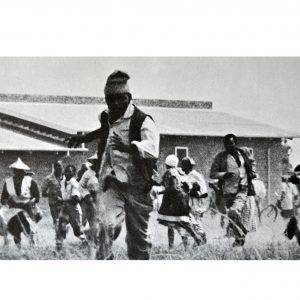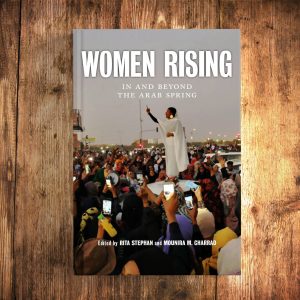Nawal El Saadawi’s enduring feminist legacy
The Egyptian doctor and writer who died on 21 March never took her eye off the ways in which violent power mutates and demands constant vigilance, yet still believed that ‘hope is power’.
Author:
30 March 2021

When she died on 21 March, 89-year-old Nawal El Saadawi’s books had been read by millions of readers across the world. Having penned more than 50 books over five decades, translated into several major Middle Eastern, Asian and European languages, her influence as a feminist icon and key thinker on the intersections of religion and power is widely appreciated.
In plays, short stories, novels, academic texts and creative non-fiction, Saadawi cared deeply about the injustices meted out through genital mutilation, as played out in conventional marriage, the rendering of women as objects in various markets under capitalism, and religious fundamentalisms. A keen student of medicine, the human mind, society and religion, she unyieldingly brought this curiosity to bear on all her work. There was no conflict she would not work through in pursuit of justice and freedom.
Unapologetically embodying the slogan of one of the feminist organisations she co-founded in her youth, “historical socialist feminism”, El Saadawi never took her eye off the ways in which violent power mutates and demands constant vigilance. She told British journalist Krishnan Guru-Murthy that “many things humiliated me as a girl”, including taunting by boys who threw stones at her breast as she walked to school. “I felt that to be aggressive, to be dissident, to attack the people who attack me is good. I shouldn’t run away.” This stubborn rage is a thread throughout her books.
El Saadawi also held on to joy, hope and humour, as her books amply demonstrate. In the interview with Guru-Murthy, she speaks of her cultivation of a proactive, joyful life, free of fear, adding, “I am very optimistic because hope is power.”
This feminist rage and powerful hope provide for one who declared, “I want to change the world. It’s a world that is full of injustice.” She called herself a creative dissident.
A questioning mind
Born on 27 October 1931 in Kafr Tahla in Egypt’s Nile Delta, she was the second of nine children. Her mother Zeinab taught her to write before she started school. Her father Sayed affirmed his daughter’s questioning mind. Together, her parents encouraged the educational aspirations of all their children, bucking tradition by refusing to marry their daughter off at the age of 10.
Zeinab and Sayed may have fed their daughter’s imagination, but they would die in 1958 and 1959 respectively without witnessing the spectacular heights their daughter would scale in medicine and literature.
By the age of 13, El Saadawi was keeping a secret journal of private reflections, an expression of her anger at unfairness, and criticisms of her parents. She would publish it in revised form as Diary of a Child Called Souad in 2015. In a public lecture delivered at New York University in May 2011, titled “Creativity, dissidence and women”, she would assert that “there is a relationship between creativity and the ability to criticise” and “all my books have lived with me since I was a child”.
Related article:
No institution escaped her analysis. Qualifying first as a thoracic surgeon, then later graduating as a psychiatrist from the University of Cairo in 1955 and later still with a master’s degree in public health from Columbia University in 1966, she found medicine both enabling and stifling.
The insights from her medical life took root in very different books. In her autobiography, The Hidden Face of Eve: Women in the Arab World, she juxtaposed her own experience of female genital cutting as a six-year-old with evaluations of how her patients have been affected by their own mutilations.
She crafted a recurring argument: that clitoridectomy is about the control of women’s sexuality, pleasure and desire in the interest of obligatory monogamy.
She immersed herself in a study on women and neurosis between 1973 and 1976, which ultimately culminated in Women and Neurosis in Egypt. She would revisit the psyche of a woman imprisoned for killing her husband, and one she had encountered in her study, in the novel Woman at Point Zero, as her writing and medical lives intertwined.
Persecution at home
The critical acclaim she received in many parts of the world was as sustained as her harassment by powerful men in Egypt. She caused such a stir that the permit for publishing The Hidden Face of Eve was denied, prompting her to publish it in Lebanon. Immediately thereafter, Muslim countries declared its importation illegal owing to its criticism of sexual power, religion and those in power. Followers of former leader Ayatollah Khomeini burnt this same book publicly in Iran in 1980 when a Farsi translation appeared in that country.
The best-selling Women and Sex had equally far-reaching effects on El Saadawi’s life. Its publication saw her dismissed as the director general of public health, unseated as the assistant general secretary of the Egyptian Medical Association and removed as chief editor of a health journal.
Related article:
Attempts to muffle her continued. President Anwar Sadat imprisoned her in 1981 for “crimes against the state”, along with 1 500 other Egyptian activists released after Sadat’s assassination and the rise to power of Hosni Mubarak.
In prison, denied access to pen and paper, she wrote the critically acclaimed 1983 Memoirs From the Women’s Prison with eyebrow pencil on toilet paper. Prior to this, she had been terrified of prison. Inside, unbroken, she realised that “creativity means you are not afraid of the unknown. You can go alone in the dark and speak your mind.” And so, she did.
Mubarak would ban the Egyptian branch of the Arab Women’s Solidarity Association that El Saadawi had co-founded, and shut down its feminist magazine in 1991, as well as ensure she was not to appear on Egyptian television or radio. Individuals would unsuccessfully petition to have her stripped of her citizenship and once, to force her divorce from her third husband, Sherif Hetata.
When Mubarak authorised her protection after a litany of death threats by providing guards, she fled to preserve her life. As she declared to an audience at Fuuse World Women in Oslo in April 2015, a feminist had much cause to be suspicious of offers of protection from violent men. “Egypt was colonised and invaded by the British under the word protection.”
Related article:
And so it was that she fled Egypt in 1993, taking up visiting professorships in American and European universities, the longest of which was at Duke University in Durham, North Carolina, in the US. She would return in the final years of Mubarak’s rule, and as one of the activists at Tahrir Square during the Egyptian revolution that formed part of the Arab Spring. The 79-year-old would outlast this powerful man, too.
Showing no sign of slowing down, she published the play God Resigns at the Summit Meeting in 2007. In it, God resigns from his job after relentless questioning by Jewish, Muslim and Christian characters. It mattered little that this was satire when her publisher was ordered to recall and burn all copies of the book.
Marriage as oppression
El Saadawi wrote repeatedly against the complex oppressions of marriage.
In an episode of British Channel 4 News podcast Ways to Change the World, she offers: “Patriarchy, in essence, is based on monogamy for women and polygamy for men.” Obligatory monogamy – enforced through a variety of factors from mutilation to abuse – is for “cutting down women’s pleasure” and reproductive control.
El Saadawi still married and divorced three husbands. The first, Ahmed Helmi, was a medical school romance and a man she left when, ravaged by addiction, he threatened to kill her. Together they had Mona Helmi, the feminist poet, author and columnist with a doctorate in economics who would be dragged to court for a Mother’s Day column in which she proposed that children take on their mothers’ names.
Related article:
Her marriage to second husband Rashad Bey collapsed when he pressed her to choose between him and her writing. Once she had chosen her writing, he refused to divorce her. At the time, the collusion of Islamic interpretation and legislation offered only a man the right to grant divorce. Ever the creative dissident with a keen eye for humour, El Saadawi reportedly threatened him with her scalpel until he granted the divorce.
Her third marriage to Sherif Hetata, a fellow doctor and dissident, lasted 46 years. Their son Atef Hetata is a documentary film maker who probes the intersections of fundamentalism, class and gender. She left Hetata for infidelity.
Revolutionary genes
El Saadawi often joked that she had inherited her revolutionary maternal grandmother’s genes. As a scientist, she knew there was no such gene. As a writer, she was saying something profound about the passing on of critical sensibility. Perhaps it is unsurprising that her children have chosen the kinds of preoccupations El Saadawi herself was so committed to taking apart.
For a feminist icon like herself, the public and private lives of writers and activists needed to be read alongside each other. “I believe in integrity. I don’t separate between private life and public life,” she told Guru-Murthy.
Writing with passion and commitment, El Saadawi remained radical to the last.




